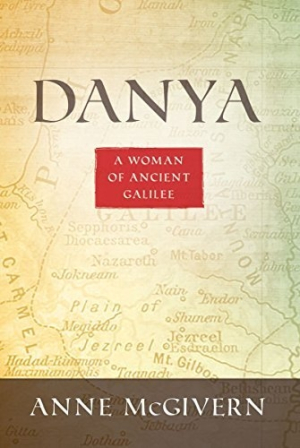
Danya
A Woman of Ancient Galilee
This historical novel draws on its own sense of time and place to re-create first-century Galilee in vivid detail.
The first century of the Common Era springs to vivid life in Anne McGivern’s accomplished and engrossing novel, Danya: A Woman of Ancient Galilee.
In the last year before the birth of Jesus, intelligent, spirited Danya begins chronicling her life in the small village of Nazareth. Roman soldiers are subjugating Jews to the empire’s rule, and Danya longs to join her older brother, Lev, and his fellow rebels in the fight against Rome. When Lev disappears in a raid that brings swift and brutal retribution, Danya and her father are forced to flee for their lives.
Thus begins the journey that takes Danya from girlhood to womanhood and from rural Nazareth to large and vibrant cities like Jerusalem and Sepphoris, the Roman capitol of Galilee. What sounds like the setup for a by-the-numbers historical novel turns into far more, and Danya emerges as a richly imagined character in a world real enough to touch.
Danya and her friends, family, and eventual husband and children are never used as props to illustrate watershed moments, but are nuanced individuals, vivid and engaging enough to transcend the era in which they live. Their questions and dilemmas—poisonous relatives, a marriage that matures into love despite differences of affection and expectation, financial hardship and loss, guilt and regret over life’s mistakes—strike familiar notes but not anachronistic ones.
Though Danya may chafe at the limited power of women and seek a way around patriarchal constraints, she does not become a feminist caricature, out of place in a world that will not change for centuries. The story is also well-served by the clear and straightforward style in which it is written. For example, rather than overanalyze the pleasure of writing out troubling thoughts and experiences, Danya simply reflects, “Seeing these crises as small letters on paper made them less formidable.”
One of the secrets—and pleasures—of the book’s success is the way it draws on its own world to convey a sense of time and place. Danya and her family are desert people living in a hot, dry climate, where a child does not stand in a welcome pool of sun but in a “blister of sunlight”; fleeing villagers “scatter like mustard seeds,” and a secret lasts no longer “than a ripe apricot.”
The story flows at a swift, even pace through the characters’ lives, spanning two decades and sustaining interest from the first page to the last. The epilogue delivers a final, rewarding surprise, while a map and a list of characters mentioned in ancient texts amplify the historical context.
Danya is historical fiction in top form, on par with Philippa Gregory or Anita Diamant. Though primarily a woman’s story, it will appeal to anyone interested in well-written fiction or in the tumultuous history of today’s Middle East.
Reviewed by
Susan Waggoner
Disclosure: This article is not an endorsement, but a review. The publisher of this book provided free copies of the book and paid a small fee to have their book reviewed by a professional reviewer. Foreword Reviews and Clarion Reviews make no guarantee that the publisher will receive a positive review. Foreword Magazine, Inc. is disclosing this in accordance with the Federal Trade Commission’s 16 CFR, Part 255.
